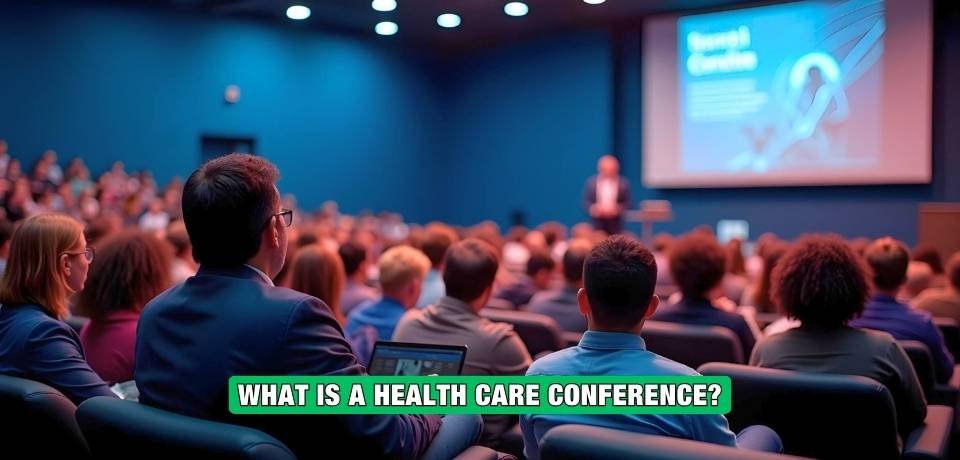Health care is a constantly changing field that requires professionals to stay updated on the latest innovations, research, and practices. With the rapid pace of advancements, industry leaders, researchers, and practitioners need to collaborate and exchange ideas.
One of the most effective platforms for this exchange is a specialized conference designed to inspire, educate, and connect experts in the field. But what is a health care conference exactly, and why is it so significant in the development of medicine and patient care?
Health care conference is an event where health professionals, researchers, and innovators come together to share insights, advancements, and strategies in the medical field. These events are designed to promote learning, collaboration, and skill development, covering a wide range of topics, from patient care practices to the latest medical technologies.
Are you curious about the benefits, key topics, and ways to make the most of attending? Read on to discover how these conferences can help you connect, learn, and stay updated in the rapidly changing field of health care. This article covers everything you need to know.
Professional and Academic Careers: How Conferences Help?
Conferences serve as invaluable platforms for professional and academic growth. They bring together experts, researchers, and professionals to discuss various topics ranging from technology and healthcare to marketing and sustainability. These events not only facilitate knowledge exchange but also provide a glimpse into emerging trends and innovations impacting industries.
Attending conferences allows participants to expand their networks, collaborate on projects, and gain insights from leading minds. For academics, presenting papers or research findings improves credibility and opens doors to publishing opportunities. Professionals, on the other hand, benefit from learning practical strategies and solutions that can be implemented in their work.
For instance, participating in the upcoming international health care conference can deepen one’s knowledge of pressing global challenges in healthcare. Moreover, such experiences often inspire fresh ideas, enabling attendees to apply newfound knowledge to their careers or research pursuits.
What is a Health Care Conference?
Conferences on health care are essential events that bring together experts from different fields to discuss and share information. These events serve as inspiration for development, pushing the boundaries of what is possible in the medical field. Here’s what you can expect from attending one.

Access to Expert Knowledge
Participating in healthcare conferences gives professionals the chance to hear from industry leaders who share the most recent findings, research, and workable solutions. Professionals engage directly with experts, gaining valuable insights. This access to firsthand knowledge helps healthcare workers stay up-to-date with current trends, equipping them with tools for better patient outcomes.
Networking Opportunities
Diverse individuals from different backgrounds come together at healthcare conferences, offering attendees special networking opportunities. Professionals meet new colleagues, discuss shared interests, and explore potential collaborations. Meeting people from different fields can lead to valuable partnerships, increasing knowledge, and opening doors to new career paths.
Innovative Technology Showcases
One major highlight of healthcare conferences is showcasing innovative technology and tools that can transform healthcare practices. Attendees get a chance to see and experience technology that could improve patient care or simplify complex procedures. This firsthand experience helps them understand how these tools work and how to use them effectively.
Skill Development Workshops
At healthcare conferences, workshops offer practical training and hands-on learning in various fields. These workshops are designed to improve specific skills that professionals need in their everyday work. Participants gain practical knowledge and leave with new techniques they can apply immediately, making these workshops very valuable.
Expanding Perspectives
Hearing from various professionals, each with a unique approach, allows attendees to see challenges from different angles. This diversity of ideas helps broaden perspectives, making attendees more adaptable and open-minded. It provides a more detailed knowledge of healthcare, allowing them to approach problems with fresh ideas and innovative solutions.
Industry Trends and Future Directions
Professionals can learn about current and future trends in the healthcare industry from conferences. They discuss emerging topics, new treatments, and advancements in technology. These insights prepare professionals for changes in their field, helping them stay relevant and informed about future developments.
Improved Problem-Solving Skills
Discussing complex cases and solutions with other professionals can enhance an attendee’s problem-solving skills. By exploring different case studies and methods, attendees gain new approaches to handling challenging situations. This exposure to diverse solutions improves their ability to tackle difficult situations in their day-to-day work.
Continuing Education Credits
Many healthcare conferences offer continuing education credits, which professionals need to maintain their licenses or certifications. Attending these conferences allows professionals to meet these requirements while learning new skills. This combination of education and certification helps them continue their professional growth without taking time away from their careers.
Improved Patient Care Knowledge
Learning about new patient care techniques and best practices can directly impact how professionals provide care. By knowing innovative ways to treat and support patients, attendees can enhance the quality of care they offer. This knowledge eventually benefits patients, helping healthcare professionals improve lives.
Motivation and Career Inspiration
Conferences provide a welcome respite full of motivation in the sometimes-demanding field of healthcare. By meeting others who share their passion, attendees feel motivated to continue their work. Speakers often share personal experiences that reignite attendees’ drive, reminding them why they chose this career path and giving them the energy to keep going.
There are many benefits to attending healthcare conferences beyond networking and education. These events promote growth, inspire change, and improve skills, making them essential for any healthcare professional looking to advance in their career.
What Topics are Discussed at Health Care Conferences?
Numerous significant topics that influence the direction of global health practices are covered at health care conferences. Professionals, researchers, and innovators gather to discuss new ideas, share insights, and explore advancements. Below are some key topics commonly discussed at these conferences.

Advancements in Medical Technology
At health care conferences, experts discuss the latest technology developments that can change patient care. Innovations like telemedicine, wearable health devices, and artificial intelligence are highlighted. These discussions often focus on how new technologies can improve diagnosis, treatment, and overall patient care in both rural and urban settings.
Patient-Centered Care Models
Patient-centered care remains a key focus at health care events. This approach puts patient needs at the center of all decisions, improving their experience and treatment outcomes. By discussing these models, health professionals can develop methods to engage patients, respect their preferences, and create a better healing environment for all.
Health Policy and Regulations
A major focus of health care conferences is the impact of policies and regulations on care delivery. Topics include policy changes, compliance requirements, and their effects on daily operations. Such discussions ensure health organizations stay up-to-date with regulations, which can influence access, cost, and quality of health care services for communities worldwide.
Innovations in Primary Care Medicine
Topics in primary care medicine aim to reduce disease rates and promote public health. Health experts discuss lifestyle changes, early detection, and public health programs to prevent illness. These conversations focus on creating strategies to empower individuals to make healthy choices that can prevent various chronic diseases and improve community health.
Health Care Workforce Development
The health care workforce is essential to providing quality care, so these conferences often focus on workforce training, retention, and well-being. Topics include handling staff shortages, enhancing skills, and supporting professional growth. Discussions help health organizations create strategies to attract, retain, and develop skilled professionals.
These conferences focus on diverse topics that align with the main goals of organizing health care conferences, offering attendees valuable insights and the latest advancements. They promote collaboration among professionals to address pressing challenges in the healthcare industry.
Who Can Attend Health Care Conferences?
A wide range of people who bring special knowledge and abilities to healthcare conferences are welcome. These events provide learning, networking, and growth opportunities. Here’s a look at the types of professionals who benefit from attending:
- Doctors and Physicians: Healthcare conferences offer doctors opportunities to learn, share insights, and connect with experts to enhance patient care and medical knowledge.
- Nurses and Nurse Practitioners: By connecting with peers, learning advanced practices, and improving their abilities to provide better patient care, nurses gain from attending conferences.
- Medical Researchers: These events help researchers share discoveries, gain feedback, and learn about advancing studies that advance healthcare and medical science.
- Healthcare Administrators: Conferences give administrators insights into effective management strategies, helping them improve healthcare facility operations and patient experiences.
- Medical Students and Interns: Attending offers students valuable exposure to real-world practices, inspiring their education and future careers in the healthcare field.
- Technologists and IT Specialists: To create and improve systems that speed up patient care, technology specialists investigate the most recent advancements in healthcare technology.
- Pharmaceutical Representatives: Conferences allow representatives to showcase new medications, network with professionals, and learn about advancements relevant to their field.
These events provide valuable learning, growth, and collaboration for anyone involved in healthcare. From seasoned experts to new professionals, healthcare conferences help them stay informed and connected, finally enhancing the entire industry.
How to Find a Suitable Health Care Conference to Attend?
Selecting the appropriate health care conference to attend can be crucial for maintaining current knowledge of industry advancements as well as for professional development. With numerous events available, knowing where to look can help narrow down the options and select one that meets your needs. Let’s see some ways to find the right health care conferences to attend:

Research Major Health Care Organizations and Associations
Health care organizations and associations host some of the most reputable conferences in the industry. These entities often share their event details on websites or newsletters, presenting attendees with options suited to specific fields. Browsing these resources can help you discover conferences, both locally and internationally, aligned with your interests and schedule.
Use Dedicated Conference Platforms
Platforms that organize conferences online gather events from multiple sources and allow easy filtering by date, location, and topic. These platforms also include essential details such as speaker lists and registration deadlines. Browsing these platforms offers a comparative view, ideal for those planning to attend multiple events throughout the year.
Explore University and Medical School Resources
Health care conferences are sponsored by medical schools and university health departments to encourage scholarly cooperation. Checking their event calendars can reveal a range of expert-led events for both students and professionals. Universities often highlight topics in research and innovation, presenting attendees with current insights from experienced health care professionals and thought leaders.
Check Peer-Reviewed Journals and Industry Publications
Industry publications and peer-reviewed journals often announce conferences relevant to recent advancements. Many of these publications provide essential information on health care conferences, including topics and speaker details. Subscribing to these resources keeps you informed about specialized events focusing on trending subjects and innovative research in health care.
Consult Professional Networks and Social Media Groups
For conference news and recommendations, professional networks and social media groups with a health care focus can be very helpful. Following health care groups and industry leaders on platforms like LinkedIn allows you to discover events and gain useful insights. These networks often provide details on conferences that align with specific career development goals.
It is worthwhile to attend health care conferences to further your career and expand your knowledge. With the right resources, finding suitable events becomes much easier. Remember to plan well in advance, as spots for popular conferences fill up quickly.
What Are the Top Health Care Conference You Can Attend?
Conferences on health care provide professionals with excellent chances to network, learn, and discover new developments in the field. These events feature discussions on emerging trends, best practices, and innovations. Below are some of the top conferences to consider attending for their wealth of knowledge and networking potential.
Global Conference on Nursing Education and Research
The Global Conference on Nursing Education and Research brings together nursing professionals, educators, and researchers to share insights. Topics include advancements in nursing education, research innovations, and improving patient care. This conference provides valuable opportunities to collaborate and learn about effective practices in nursing education and healthcare delivery.
Health Leadership Conference
The Health Leadership Conference, hosted by the National Health Council, convenes CEOs, executive directors, senior staff, and board leaders from leading patient organizations. Focused on “The Future of Leadership,” it offers insights into evolving leadership practices, nonprofit trends, and health care policy, encouraging innovation and collaboration for navigating the changing health care landscape.
HIMSS Global Health Conference & Exhibition
The HIMSS Global Health Conference & Exhibition covers a wide range of health information and technology topics. It attracts professionals from health IT, technology, and policy sectors. Key topics include electronic health records, cybersecurity, and data management. The conference emphasizes digital solutions that improve patient care, efficiency, and health system performance.
Global Conference on Nursing and Healthcare Management
Nursing leaders and healthcare administrators come together at the Global Conference on Nursing and Healthcare Management. It focuses on effective management strategies, workforce development, and leadership practices. Discussions cover enhancing patient care, improving staff performance, and optimizing healthcare delivery systems. The conference helps participants address key challenges in healthcare management.
AMIA’s Clinical Informatics Conference
AMIA’s Clinical Informatics Conference is a dynamic event of clinical informaticians focused on transforming innovation into actionable solutions for improved patient care. Over three days, participants engage with thought leaders, explore strategies to reduce clinical burden, and share insights, leaving inspired to advance healthcare delivery and achieve impactful outcomes.
These conferences provide diverse opportunities for professionals to expand their knowledge, develop new skills, and collaborate with experts. Each event plays an important role in advancing health care practices globally.
Tips to Help You Be Prepared for a Health Care Conference
Participating in a health care conference provides beneficial opportunities for networking and education. Being well-prepared helps you maximize the benefits, connect with peers, and absorb new insights. Here are essential tips to help you get ready.
- Research the Agenda: Learn about the conference topics, speakers, and sessions in advance. Knowing the agenda helps you prioritize sessions that align with your professional goals.
- Set Clear Goals: Determine what you want to achieve from the event, whether it’s networking, learning about trends, or exploring new practices. Clear goals keep your focus sharp.
- Prepare Your Questions: Create a list of questions for speakers or fellow attendees. Having these ready ensures you gain the most from conversations and presentations.
- Organize Your Materials: Bring business cards, a notebook, and any necessary documents. Keeping essentials organized helps you focus on learning and engaging with others at the event.
- Network with Intention: Identify people you want to meet, such as speakers or industry leaders. Approach networking purposefully, which enhances your connections and makes conversations more meaningful.
- Download the Conference App: Many conferences offer apps with schedules, speaker bios, and networking features. Using the app helps you stay organized and makes it easy to manage your time.
- Plan Your Schedule: Review the sessions and plan your day to avoid missing valuable presentations. Scheduling helps you cover topics that matter most to your professional growth.
- Dress Comfortably and Professionally: Choose attire that looks professional but allows for comfort. Conferences often involve long hours, so comfortable clothing helps you stay focused and confident.
- Follow-Up After the Conference: After the event, reach out to contacts you met to solidify connections. Follow-up messages keep relationships active and create potential for future collaboration.
Preparing well for a health care conference makes the experience more valuable. Planning, networking, and engaging thoughtfully allow you to benefit fully from each opportunity. With the right approach, these events can significantly enrich your career.
How to Network Effectively at a Health Care Conference?
Making a good connection at a health care conference can result in insightful conversations and lasting professional relationships. Networking with purpose allows you to expand your contacts, gain new perspectives, and strengthen your place in the industry. Follow these practical steps to make the most of your networking efforts.

Step 1: Approach with Confidence
A confident approach leaves a lasting impression on new acquaintances. Take a moment to prepare a friendly greeting and introduce yourself naturally. Confidence helps you stand out and shows others you’re engaged, making conversations more comfortable and open.
Step 2: Listen More Than You Speak
Genuine listening encourages trust and makes others feel valued in conversation. By paying attention to their insights and responses, you’ll create a strong foundation for lasting connections. Active listening shows your interest in their experiences, making each exchange more memorable.
Step 3: Share Relevant Stories or Experiences
It is easier to connect with someone when you share a short, relevant story or experience. By offering a personal insight or professional experience, you make the conversation relatable and engaging. This approach invites others to open up, leading to more meaningful exchanges.
Step 4: Remember Names and Details
If you want to build rapport with someone, you should remember their name or some details from your conversation. Small details, like recalling a project they mentioned, show attentiveness and create a positive impression. People appreciate these gestures, which can strengthen your networking connections.
Step 5: Express Appreciation Before Parting
End each interaction with a positive note, expressing appreciation for their time or insights. This courteous gesture leaves a lasting impression and makes people more likely to remember you. Kind words go a long way in establishing a professional, respectful connection.
Networking successfully at a health care conference means focusing on genuine, positive interactions. Each step contributes to building lasting professional connections and opens the door to future opportunities that can enrich your career and professional journey.
FAQs About What is a Health Care Conference?
Health care conferences are essential events where medical professionals gather to share knowledge, explore new trends, and network. Below, we’ve compiled some frequently asked questions about health care conferences to help you understand their purpose, benefits, and other details you might be curious about.
How Often Are Health Care Conferences Held?
Depending on the organization, health care conferences take place at different times of the year. Some are annual events, while others might occur semi-annually or quarterly. These different schedules allow health professionals many opportunities to stay informed about the latest industry trends and advancements.
What Should I Bring to a Health Care Conference?
To make the most out of a health care conference, it’s best to bring essentials like business cards, a notebook, and a charged mobile device. Preparing relevant questions or discussion points beforehand will also help you engage effectively with speakers and attendees, enhancing your conference experience.
Can Health Care Conferences Be Attended Virtually?
Many health care conferences now offer virtual attendance options. This flexibility allows attendees who cannot travel to still participate. Virtual conferences provide access to live presentations, Q&A sessions, and even some networking opportunities, ensuring that knowledge sharing continues regardless of physical distance.
What Are the Costs Associated With Attending a Health Care Conference?
The costs for attending health care conferences vary widely depending on location, length, and prestige. Registration fees can range from hundreds to thousands of dollars, with additional expenses for travel, lodging, and meals. Many organizations offer early bird rates or discounts for students to make attendance more accessible.
How Long Does A Typical Health Care Conference Last?
Most health care conferences last between two and four days, though some may extend up to a week for larger events. The schedule usually includes keynote speeches, workshops, and networking sessions, all planned to maximize learning and engagement while offering enough time for attendees to connect.
Final Words
One effective strategy to stay informed and advance your career is to attend a health care conference. These events provide opportunities to connect with experts, learn about new trends, and gain insights that can directly impact your career and the way you provide care.
So, what is a health care conference? It is an event where medical professionals, researchers, and innovators gather to share knowledge, discuss emerging trends, and explore advancements. These conferences help attendees stay up-to-date and improve their skills to provide better care to patients.
If you plan to attend, remember to set clear goals, network actively, and stay engaged in sessions that interest you. Stay prepared, make the most of the opportunities, and enjoy the experience. Best of luck on your adventure to advance in the health care field!

Leave a Reply